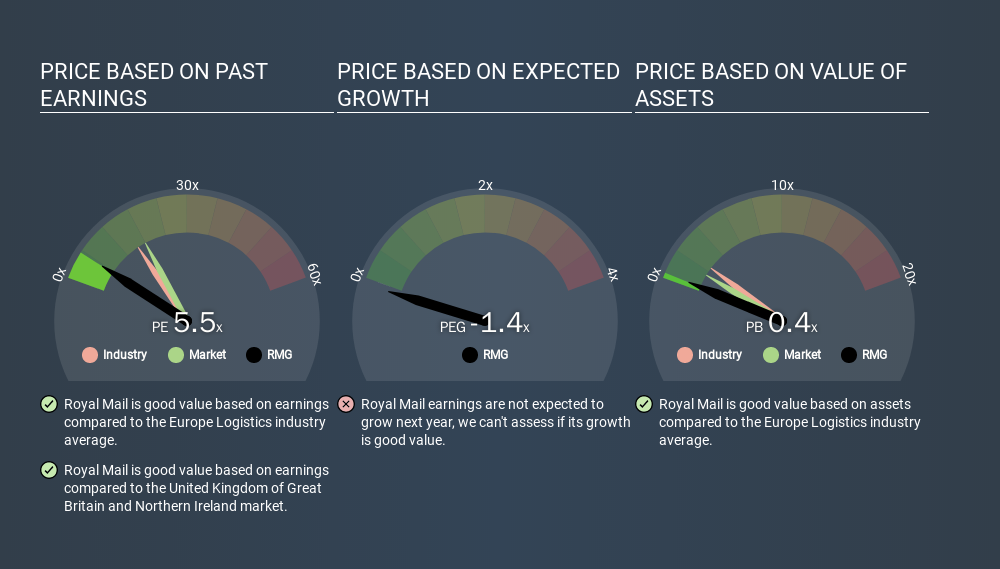- United Kingdom
- /
- Logistics
- /
- LSE:IDS
Here's How P/E Ratios Can Help Us Understand Royal Mail plc (LON:RMG)

This article is for investors who would like to improve their understanding of price to earnings ratios (P/E ratios). We'll show how you can use Royal Mail plc's (LON:RMG) P/E ratio to inform your assessment of the investment opportunity. Royal Mail has a P/E ratio of 5.53, based on the last twelve months. That means that at current prices, buyers pay £5.53 for every £1 in trailing yearly profits.
Check out our latest analysis for Royal Mail
How Do You Calculate A P/E Ratio?
The formula for P/E is:
Price to Earnings Ratio = Share Price ÷ Earnings per Share (EPS)
Or for Royal Mail:
P/E of 5.53 = GBP1.79 ÷ GBP0.32 (Based on the year to September 2019.)
Is A High P/E Ratio Good?
A higher P/E ratio means that investors are paying a higher price for each GBP1 of company earnings. That isn't a good or a bad thing on its own, but a high P/E means that buyers have a higher opinion of the business's prospects, relative to stocks with a lower P/E.
Does Royal Mail Have A Relatively High Or Low P/E For Its Industry?
We can get an indication of market expectations by looking at the P/E ratio. The image below shows that Royal Mail has a lower P/E than the average (15.6) P/E for companies in the logistics industry.

Its relatively low P/E ratio indicates that Royal Mail shareholders think it will struggle to do as well as other companies in its industry classification. Since the market seems unimpressed with Royal Mail, it's quite possible it could surprise on the upside. If you consider the stock interesting, further research is recommended. For example, I often monitor director buying and selling.
How Growth Rates Impact P/E Ratios
Probably the most important factor in determining what P/E a company trades on is the earnings growth. That's because companies that grow earnings per share quickly will rapidly increase the 'E' in the equation. And in that case, the P/E ratio itself will drop rather quickly. And as that P/E ratio drops, the company will look cheap, unless its share price increases.
Royal Mail's earnings made like a rocket, taking off 233% last year. Having said that, if we look back three years, EPS growth has averaged a comparatively less impressive 15%.
Don't Forget: The P/E Does Not Account For Debt or Bank Deposits
It's important to note that the P/E ratio considers the market capitalization, not the enterprise value. So it won't reflect the advantage of cash, or disadvantage of debt. Theoretically, a business can improve its earnings (and produce a lower P/E in the future) by investing in growth. That means taking on debt (or spending its cash).
Spending on growth might be good or bad a few years later, but the point is that the P/E ratio does not account for the option (or lack thereof).
Is Debt Impacting Royal Mail's P/E?
Royal Mail's net debt is 12% of its market cap. That's enough debt to impact the P/E ratio a little; so keep it in mind if you're comparing it to companies without debt.
The Bottom Line On Royal Mail's P/E Ratio
Royal Mail has a P/E of 5.5. That's below the average in the GB market, which is 18.0. The company hasn't stretched its balance sheet, and earnings growth was good last year. The low P/E ratio suggests current market expectations are muted, implying these levels of growth will not continue.
Investors should be looking to buy stocks that the market is wrong about. If the reality for a company is not as bad as the P/E ratio indicates, then the share price should increase as the market realizes this. So this free report on the analyst consensus forecasts could help you make a master move on this stock.
Of course, you might find a fantastic investment by looking at a few good candidates. So take a peek at this free list of companies with modest (or no) debt, trading on a P/E below 20.
If you spot an error that warrants correction, please contact the editor at editorial-team@simplywallst.com. This article by Simply Wall St is general in nature. It does not constitute a recommendation to buy or sell any stock, and does not take account of your objectives, or your financial situation. Simply Wall St has no position in the stocks mentioned.
We aim to bring you long-term focused research analysis driven by fundamental data. Note that our analysis may not factor in the latest price-sensitive company announcements or qualitative material. Thank you for reading.
About LSE:IDS
International Distribution Services
Operates as a universal postal service provider in the United Kingdom and internationally.
Adequate balance sheet and fair value.


